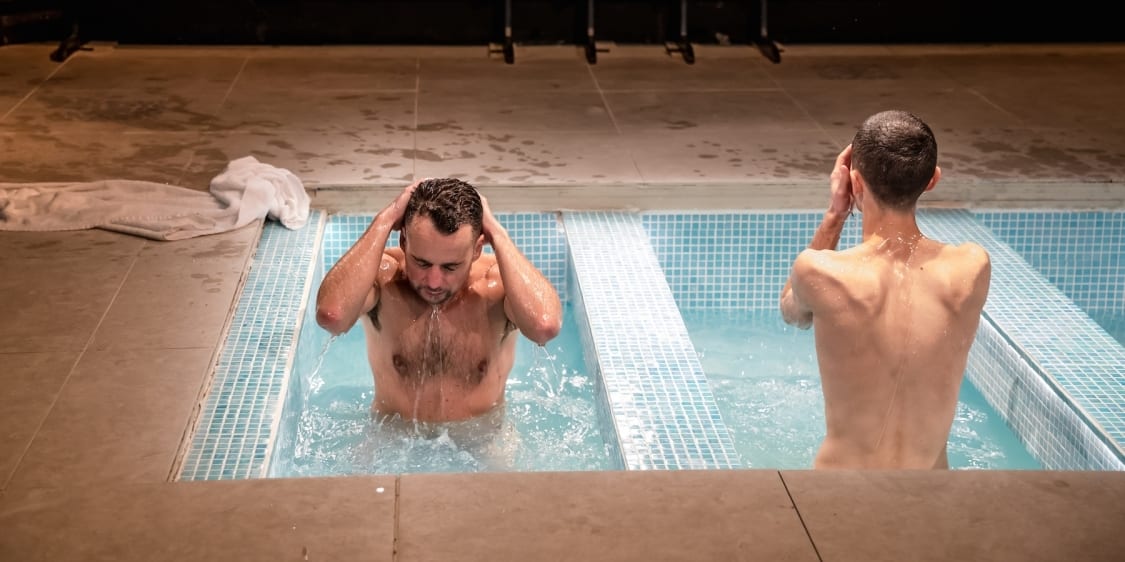The sheer length of a play is often no guide to the emotional sense of time passing: some short plays drag and others leave you wishing them longer. This one seems just about right. Its sharp focus on one apparently improbable relationship, a passing but important incident in two men’s lives, is fully worked out and played here with great depth of carefully etched-in characterisation by two actors at the top of their game.
This nearly new play, which had a brief outing at The Yard in 2015, focuses around the Jewish institution of the ‘mikvah’, a pool of rainwater used for purification rituals of total naked immersion. More often used by women, but in this case by two men, the mikvah is made the centrepiece of a very simple and effective set in this production, lined with pretty turquoise tiles and with LED lights as well. Simple gestures at changing facilities are at the corners of the set, and there is ample room for plenty of splashing and glittering, dappled lighting effects.
Within this spare but richly evocative space is played out the drama of Avi (Alex Waldmann) and Eitan (Josh Zaré). Avi is in his mid-30s, and as ‘woke’ as can be, at least on the surface. Full of carefully considered and considerate opinions, working for a human rights organisation, and trying for a child with his wife, he is still anxious enough to visit the mikvah to promote the mobility of his sperm. Eitan is a sparky, larky, experimenting teenager, offering a jumbled up mixture of faux confidence and gawky vulnerability.
Both actors capture the many-sided aspects of their characters immediately, their conversations, punctuated by a lot of bathing and changing, going from awkwardness to insight and empathy and finally intimacy in short order, covering a huge amount of emotional territory in no time at all. Eitan is drawn to Avi by his beautiful singing voice in the synagogue and by his apparent calm and kindly confidence, and Avi is unsettled and finally unravelled by Eitan’s challenge to the artificial order of his life and a charming, cheeky invitation to explore sides of himself he had pushed aside.
Zaré is particularly fine in spinning free-associative teenage fantasy, and changing the emotional register on a sixpence in a very plausible teenage fashion. Waldmann lets his mask slip gradually and suggests anxiety, bloke-ish swagger and vulnerability in telling sequence. He commands a very broad emotional palette, as anyone who saw his Henry VI at Kingston some years ago will recall. They both negotiate some complex fantasy sequences as well, where success relies very much on the energy and empathy of their mutual acting. A trip to Alicante manages to suggest a weekend of raucous and colourful carousing all in about two minutes flat.
Only the ending strikes a few false notes. Of course this encounter is bound to be a brief one, and it concludes as Avi transitions into fatherhood and deliberately closes down other possibilities. The intensity of teenage mourning for a first relationship is very well conveyed here, but a melodramatic scene in the synagogue, and a hint of a suicide attempt seem at variance with the quietly articulated and calibrated emotions of what has gone before; and the reactions of Avi’s wife who becomes a character in her own right in the final ten minutes seem unlikely in the broader context of the piece.
These moments of awkwardness aside, this is a moving and tender evening and a wonderful display of tasteful acting skill by both performers. Georgia Green’s direction does not dawdle or force the pace unduly, and there is always something visual going on to balance and complement the fine grained humour and poignancy of the text. While some may lament the fact that there is not more self-conscious exploration of ideas, and in particular of the relationship of Judaism with homosexuality, the play works on its own terms as a human drama, and the characterisations are perhaps better for stressing the fuzzy, shifting uncertainty of sexual attraction and identities rather than seeking out harsher intellectual polarisations. It is a very inclusive style of writing that mingles ordinary dialogue with the third-person perspectives that Hilary Mantel has made famous, and shifts gear from watery realism through to stylised symbolism. The actors and creatives have grasped the opportunities provided to make this a hugely rewarding evening.

